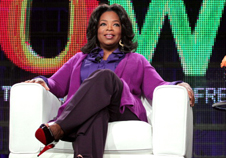3Qs: Queen of Daytime TV relinquishes throne — for now

After dominating daytime television for 25 years, Oprah’s beloved talk show ends today, allowing her to focus on her new cable channel, OWN. For years, the host, philanthropist, entertainer and savvy businesswoman recommended books and products, gave away gifts, trips and cars, and connected with audiences and home viewers in a uniquely personal way. Here, Bill Lancaster, a lecturer in communication studies and 20-year veteran of television production, discusses how Oprah defined the daytime slot and affected her viewers — and who may be next in line for the title of Queen of Daytime TV.
How did Oprah’s show define the landscape of daytime television?
I would say that she really helped to revive what is the otherwise doldrums of television programming. Daytime TV doesn’t have the glamour and star power of the evening shows and it’s often been called a wasteland of programming. She came along and really put daytime on the map, which, in turn resulted in a real boost for television stations and advertisers. So, you can’t exaggerate the amount of attention and advertising revenue that she brought to daytime.
How did she affect her viewers?
She has connected to American television viewers like few television hosts in recent broadcast history have. She was everyone’s sort of mom, sister and next-door neighbor. Talk shows are all about the likability of the hosts even more than they are about the content of the show, and her ability to connect with her audience is extraordinary. — not to mention that she comes across as someone who really cares about helping others. Often on the show she’ll remind viewers, “I’m here to educate and inform you, not to entertain you. If in some sense along the way I do entertain you, that’s fine, but my main mission is to inform, to help and to educate.” Millions of people got practical, valuable information from her show, whether it was about personal health, dealing with family problems, or even the news. It is important to put all of this in the context of Oprah the shrewd businesswoman. While I don’t doubt that she has the genuine interests of people in mind, it must be understood that she has worked hard to sell her show, supporting the advertisers and making the affiliate stations happy. She has been incredibly entrepreneurial and has had phenomenal success at selling this product called Oprah.
Who will fill her shoes?
The answer to that is very simple: no one will be able to take the place of Oprah. Someone like that comes along once every 50 years, so no one is going to hit with the impact of that woman. Plus, you really have to look beyond her television career — there are some pundits would argue that she helped put President Obama in office, for instance. There may even be a little disappointment about the fact that someone with so much trust, so much star power, and a net worth of more than a billion dollars, isn’t planning do something very big, like run for office. Instead, it can be seen as somewhat anticlimactic that she is using this incredible value to start a television network. Furthermore, as someone who’s been in the business for 25 years, I can tell you that this is a very risky move. Simply put, the odds of launching a new, successful TV show — let alone an entire network — are extremely slim, so I don’t believe anyone would be surprised if this venture fails. Then again, Oprah of all people has the wherewithal to keep it afloat and keep her brand strong.
Perhaps the biggest takeaway from this end of an era, besides the fact that tens of millions of viewers won’t be able to have their coffee with Oprah each day, is that the show’s absence from daytime television represents a monumental revenue loss to local stations and advertisers everywhere.




